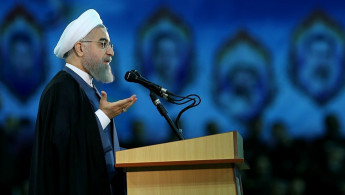Iran parliament approves nuclear deal with world powers
Iran's parliament approved its nuclear deal with world powers Tuesday, paving the way for the historic agreement curbing Tehran's atomic programme to take effect and for the eventual lifting of sanctions.
The vote came after fierce debate among lawmakers over the terms of the accord, which was struck on July 14 but has faced a rough ride from hardliners in Tehran and in the US Congress.
A motion to approve the nuclear deal was however passed with 161 votes in favour, 59 against and 13 abstentions, Iran's official IRNA news agency and other media said.
State television did not broadcast Tuesday's vote but Iranian media outlets reported that there were angry scenes and some MPs shouted that their concerns had not been addressed.
A notorious critic of the nuclear diplomacy, Hamid Rasaie, was pictured on social media holding up a piece of paper declaring: "This is an official violation of law. Parliament is a sham."
Another ultraconservative MP, Mehdi Kouchakzadeh, was quoted as saying: "This is no one's decision, it is Larijani's decision," in a reference to a refusal by parliament speaker Ali Larijani to allow him to speak.
Kouchakzadeh was led away by other lawmakers, the ISNA news agency said.
A tally of the vote to pass the nuclear deal, known officially name as the Joint Comprehensive Plan of Action [JCPOA], said 250 of Iran's 290 MPs were present. The count suggested 17 members had attended but did not vote.
The nuclear agreement between Iran and the so-called P5+1 group [Britain, China, France, Russia and the United States plus Germany] came after almost two years of diplomacy.
Only lawmakers in the United States and Iran, sworn enemies since the Islamic revolution in 1979, had insisted on voting on it.
The deal, which will lift nuclear-related sanctions on Iran in return for curbs on its atomic activities - the Islamic republic denies seeking a bomb - has been widely hailed as a diplomatic triumph that averts military confrontation and another possible war in the Middle East.
 |
|
| Click here to enlarge |
Rouhani to address nation
But opponents of the diplomacy, including Israel and American lawmakers, say it has empowered Iran and will not halt a dash for atomic weapons should the Islamic republic want them.
Members of the US Congress failed in September to torpedo the deal, with President Barack Obama's White House securing enough support in the Senate to protect the agreement.
But the accord has been debated in Tehran for months, with some MPs repeatedly warning of holes in the text.
Iran's President Hassan Rouhani, who is expected to speak on state television later Tuesday, and other officials have faced attacks over the way they engaged with the US and other countries to secure the agreement.
In selling the deal to sceptics, Rouhani's government said its negotiators protected the future of Iran's nuclear programme while ensuring sanctions, that have ravaged its economy, would end.
However, as late as Sunday parliament was the scene of a clear divide over the agreement.
Ali Akbar Salehi, head of Iran's Atomic Energy Agency, went on the attack for the government after he and other negotiators were accused of having capitulated to the West.
Guidelines, known as red lines, for the talks were laid down by Iran's supreme leader, Ayatollah Ali Khamenei, and the Supreme National Security Council that he oversees.
Tuesday's motion, titled "Iran's Plan for Reciprocal and Proper Action in Implementing JCPOA" allows the government to proceed, IRNA reported.
Iranian officials have said sanctions should be lifted by the end of the year or January 2016 at the latest.
However Iran also has to satisfy the International Atomic Energy Agency, the UN nuclear watchdog, of the exclusively peaceful nature of its atomic programme.
The IAEA faces a December 15 reporting deadline to resolve what it had termed "ambiguities" over Iran's past nuclear activities.





 Follow the Middle East's top stories in English at The New Arab on Google News
Follow the Middle East's top stories in English at The New Arab on Google News
![Israeli forces ordered bombed Gaza's Jabalia, ordering residents to leave [Getty]](/sites/default/files/styles/image_330x185/public/2176418030.jpeg?h=a5f2f23a&itok=_YGZaP1z)

